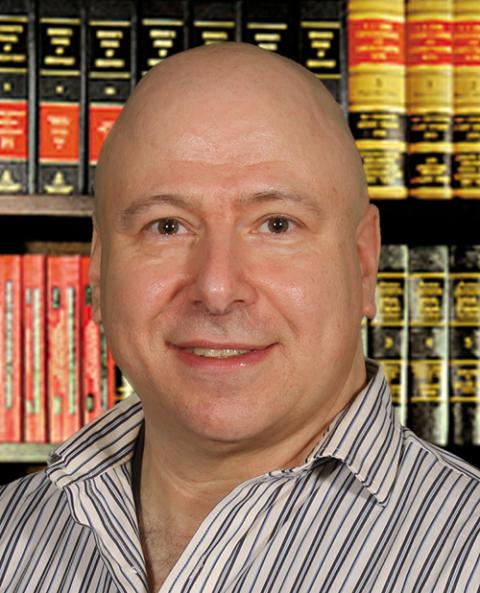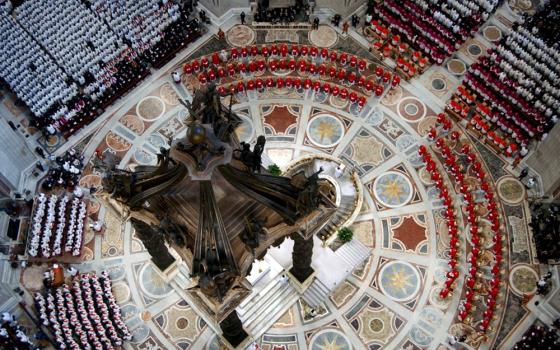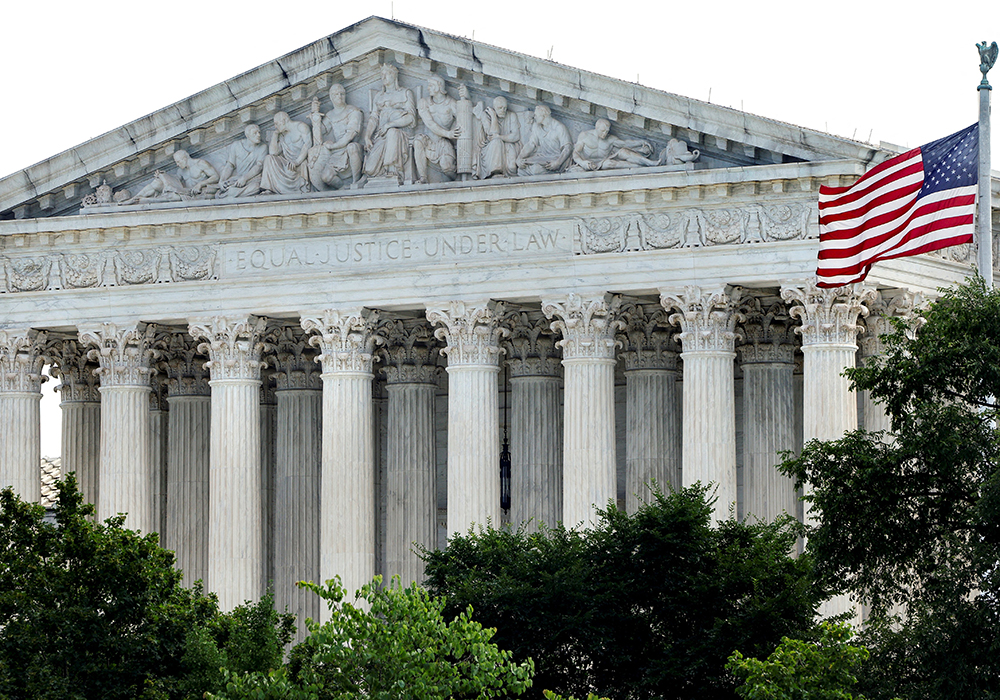
The U.S. Supreme Court in Washington is seen June 17, 2024. St. Isidore of Seville Catholic Virtual School is at the center of a legal battle to be argued before the Supreme Court on April 30. (OSV News/Reuters/Evelyn Hockstein)
St. Isidore of Seville Catholic Virtual School is at the center of a titanic legal battle to be argued before the U.S. Supreme Court on Wednesday.
And it hasn't even opened yet.
A creation of the Roman Catholic Archdiocese of Oklahoma City and the Diocese of Tulsa, St. Isidore is a proposed virtual charter school intended for underserved rural Oklahoma counties, designed to have a curriculum embedded with Catholic teachings and be a place of evangelization of the Catholic Church.
And in a controversial decision, the state has directed that taxpayer dollars directly fund the school.
Enter the U.S. Supreme Court where oral arguments are set for April 30. Some legal scholars anticipate that the outcome of this case might be a landmark ruling with far-reaching consequences for the separation of church and state.
A decision in favor of St. Isidore of Seville Catholic Virtual School could not only set a precedent that charter schools are private institutions for purposes of federal and state law, but experts say such a ruling might also allow taxpayer dollars to directly fund faith-based charter schools across the country.

The likeness of St. Isidore of Seville is seen at St. Anthony's Church in Manteca, California. In Oklahoma, the saint is the patron of an online Catholic-run public charter school open to students throughout the state from K-12. The Statewide Virtual Charter School Board approved the St. Isidore of Seville Catholic Virtual School in June 2023 but it has been challenged on constitutional grounds by the attorney general. The case goes before the U.S. Supreme Court April 30. (OSV News/The Crosiers/Gene Plaisted)
"I think it's going to open it up to all faith-based schools. It's going to be a game changer," said Charles Russo, a University of Dayton law professor who studies education law. Russo told National Catholic Reporter that he expects the court to rule in the Oklahoma virtual K-12 school's favor.
"I see this in a line of recent Supreme Court cases where the court has been lowering the bar on the Establishment Clause," said Russo, who sees the court's decision to hear the case as consistent with an intent to dismantle the so-called wall of separation between church and state.
"This school is encroaching on the line of establishing religion, which is a pretty dicey line to be crossing," Russo said, adding that a ruling in favor of the school could create a "dangerous precedent" of religion being funded by the government.
'I think it's going to open it up to all faith-based schools. It's going to be a game-changer.'
—Charles Russo, University of Dayton law professor
Attorneys representing St. Isidore argue that the case is really about the constitutional rights of religious organizations in Oklahoma to have access to a state program that permits other private groups to operate charter schools. In their view, to deny St. Isidore's charter constitutes unlawful religious discrimination.
"Our whole point is not that the government can run religious schools, teach religious education or require kids to receive a religious education. We are saying that the government can't exclude private organizations from doing that in a neutral benefits program," said John Meiser, director of the Lindsay and Matt Moroun Religious Liberty Clinic at the University of Notre Dame, which is representing St. Isidore.
Meiser told NCR that the Supreme Court's decisions in three cases dating back to 2017 establish a legal precedent that states cannot deny generally available aid to institutions or individuals solely because they are religious.
"The case is obviously important, especially as it presents an important question about the vitality of the court's recent precedents," Meiser said.
The cases that Meiser cited — Trinity Lutheran of Columbia, Inc. v. Comer in 2017, Carson v. Makin in 2022, and Espinoza v. Montana Department of Revenue in 2020 — all dealt with private religious institutions. But as a charter school, St. Isidore is considered a public school under Oklahoma law, a definition that the school's attorneys are challenging.
"The case is really about what kind of school is St. Isidore," Meiser said. "That's really the whole case."
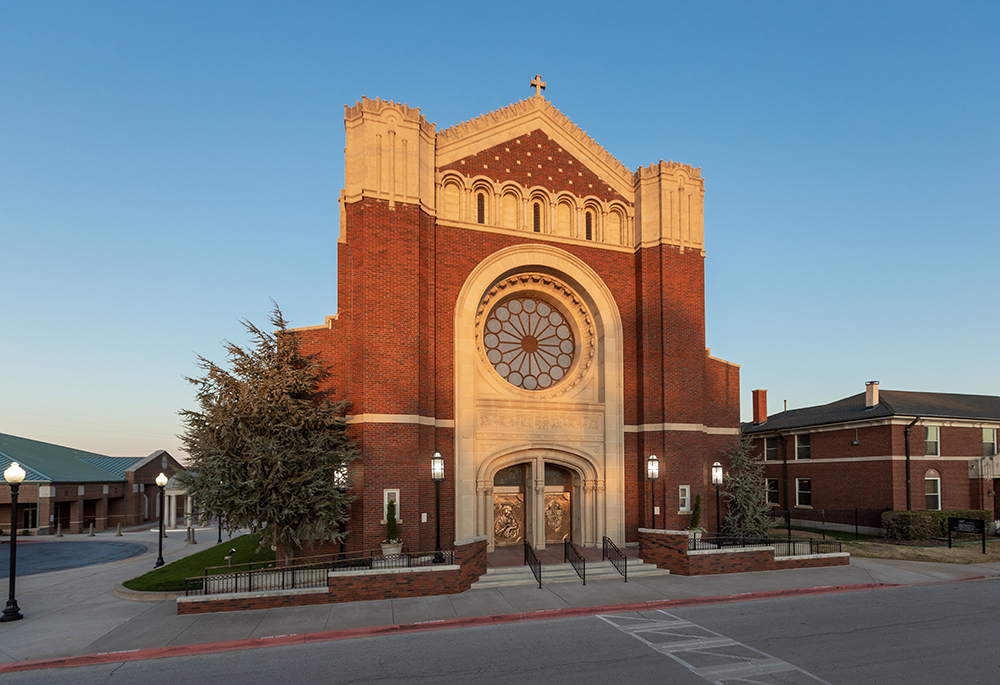
The Cathedral of Our Lady of Perpetual Help is pictured in Oklahoma City, Oklahoma. St. Isidore of Seville Catholic Virtual School is a creation of the Roman Catholic Archdiocese of Oklahoma City and the Diocese of Tulsa; It is a proposed virtual charter school intended for underserved Oklahoma counties. (OSV News/Courtesy of the Archdiocese of Oklahoma/Chris Porter)
In the St. Isidore case, the Supreme Court may have to decide whether a religious organization becomes an arm of the state if it receives public money to operate a charter school. Though it would be funded by taxpayers, St. Isidore's attorneys argue that the school remains a private entity.
"All sorts of private organizations and private companies enter into contracts with the federal government," Meiser said. "Lockheed Martin doesn't become the U.S. government because it signs a contract with them."
The U.S. Conference of Catholic Bishops agrees with that argument. In an amicus brief filed in support of the school, the conference described St. Isidore as a private school and likened Oklahoma state laws that prohibit religious charter schools to the controversial Blaine Amendments that several states enacted in the late 19th century to restrict public funding of religious institutions.
"Oklahoma does not need to subsidize private education, but it has wisely chosen to do so. And because it has, 'it cannot disqualify some private schools solely because they are religious,' " the bishops' conference wrote in its amicus brief, where it quoted the Espinoza ruling in 2020.
St. Isidore's position that the case rests on a private school's right of religious free exercise, rather than on the question of whether a religious charter school violates the U.S. Constitution's prohibition against the establishment of religion, would have been "laughable" a decade ago, said Frank Ravitch, a professor at Michigan State University's College of Law who studies the relationship between law and religion in the United States.
"With that said, I absolutely understand why St. Isidore's lawyers are making that argument, because they have a court that might actually buy it," said Ravitch, who accused the Supreme Court of having "obliterated" the separation of church and state in its recent decisions.
"If they rule in the school's favor here, then they will have essentially ruled the Establishment Clause out of the Constitution, or rendered it to be almost meaningless," Ravitch said.
In addition to First Amendment religious grounds, the St. Isidore case highlights legal gray areas pertaining to charter schools. Though state laws usually consider them to be public schools, they are often operated by groups and nonprofits with privately appointed boards that do not have to abide by the same rules and regulations as conventional public schools.
Advertisement
"With this hybrid aspect, where they have public and private aspects, it's made it difficult at times for the courts to determine whether they are private entities or public entities under the law," said Preston Green, a University of Connecticut professor who studies charter schools.
In 2010, as reported in The Conversation, the U.S. Court of Appeals for the Ninth Circuit ruled that an Arizona charter school corporation was not a state actor for employment purposes. But in 2022, the U.S. Court of Appeals for the Fourth Circuit ruled that a North Carolina charter school board was a state actor, and that the 14th Amendment's equal protection clause applied to the school.
"So there's a conflict there," Green said.
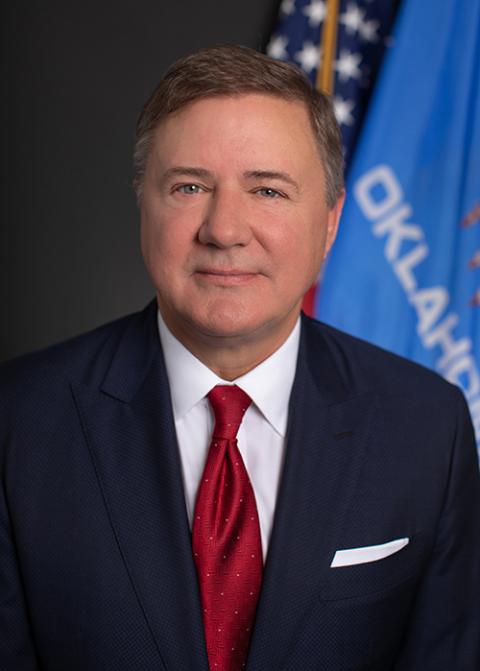
Oklahoma's Republican Attorney General Gentner Drummond is pictured in an undated photo. (OSV News photo/Legislative Service Bureau/Abi Ruth Martin)
In June 2024, the Oklahoma Supreme Court voted 7-1 that the Statewide Virtual Charter School Board's decision in 2023 to approve St. Isidore's application violated the U.S. Constitution's Establishment Clause, as well as provisions of the Oklahoma Constitution and the state's charter school law that explicitly prohibit public money from being used to support sectarian activities.
Oklahoma Attorney General Genter Drummond, a Republican, broke with members of his party in petitioning his state's high court to strike down St. Isidore. In his filing with the U.S. Supreme Court, Drummond argued that charter schools are public schools, and that the state has the right to insist that they be "strictly secular." He also argued that the U.S. Supreme Court would sow "chaos and confusion" for millions of charter school students nationwide if it ruled in St. Isidore's favor.
"Adopting that position would upend the charter-school system to the detriment of children and families whose hopes are tied to such schools and radically change the relationship between Church and State," Drummond wrote.
Drummond's concerns were echoed by Rachel Laser, the president and CEO of Americans United for Separation of Church and State, a group that among several others in 2023 filed a lawsuit in Oklahoma challenging St. Isidore's constitutionality.
"This is the most basic and fundamental violation of church-state separation as they come, which is why the Oklahoma highest court ruled the way it did," said Laser, who told NCR that a ruling in favor of St. Isidore would create "a sea change in our democracy."
"It's going to open the door to religious public schools eventually in every community, with limited options for families seeking secular inclusive education, and particularly discriminatory environments for children from households that belong to religious minorities or who are non-religious," Laser said.
Meiser, of the Religious Liberty Clinic at the University of Notre Dame, rejected suggestions that St. Isidore could impact public school policy beyond Oklahoma. He argued that the case is limited to the question of whether or not charter schools in that state are extensions of the government.
"The fear mongering about how the school affects education policy across the country, it's just not true," Meiser said.
Ravitch, of Michigan State University's College of Law, said the case's impact will rest on how the court frames its decision. "Do they make it unique to Oklahoma's contracting system or something else?" he said.
As to why the Supreme Court agreed to take up the St. Isidore case, Ravitch said the justices could either be looking to determine that religious charter schools have a right to public funding, or declare that the court's precedents do not apply because charter schools are public schools.
"Given the current court, it's more likely the former than the latter," Ravitch said. "But you never know."



